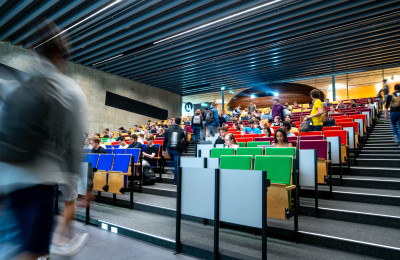Universities take steps towards more Dutch-taught Bachelor’s programmes
Topical

Contact

Universities are reducing the percentage of fully English-language undergraduate programmes by almost a third. Universities informed Robbert Dijkgraaf, the minister of Education, Culture and Science, of their plan to introduce a Dutch-taught variant to 35 English-taught Bachelor’s programmes. Jouke de Vries, the acting president of UNL, said: ‘Universities are taking a serious step in terms of balancing out greater internationalisation in education with student intake numbers. In order to do that effectively, we need the support of politicians – at the very least in the form of legal instruments made available in the very near future to be able to control the influx of students.’
Contact

On 8 February, universities presented a package of administrative agreements including measures aimed at controlling the influx of international students and strengthening Dutch language skills. Today, the universities will be providing more information about the implementation and follow-up of these measures. Following the Hertzberger motion in the House of Representatives, Minister Dijkgraaf today submitted a more detailed outline of the impact and follow-up of the measures to Parliament.
Now that universities collectively have arrived at administrative agreements on internationalisation, individual universities will begin working on implementing those agreements. Each university will draw up an implementation plan, which will be discussed with its representative advisory bodies by the end of the summer, after which it will be clear which definitive steps will be taken. The initial survey shows that four Bachelor's programmes will switch completely to Dutch, a Dutch-language variant will be introduced into 35 English-language programmes and that 27 programmes want to introduce an enrolment quota for the English-language pathway. This will ensure accessibility for Dutch students to these programmes at all times, however, must equally be made possible under the law first. Universities are calling on politicians for this to be sorted out in the very near future so that they can start introducing it as early as the 2025-2026 academic year.
In addition to the agreements on the language of instruction, universities also tightened the agreements inter alia on students' Dutch language skills, recruitment abroad and on the retention rate of graduates.
Preserving the added value of internationalisation
Universities are taking these measures to preserve the added value of internationalisation without adverse impact on the Netherlands. Indeed, internationalisation is very important to the scientific community, our economy and the future of our students. It contributes to a stimulating academic environment, responsiveness to international scientific developments and training a sufficient number of talented professionals for the labour market. In addition, international students also hold significant value for the Dutch economy. At the same time, universities recognise that internationalisation has also created several problems that have necessitated the above measures.
In the near future, universities will continue discussions with the Ministry of Education, Culture and Science regarding the approach to internationalisation based on self-direction on the part of universities.
Please find the full letter (in Dutch) to Minister Dijkgraaf here.
